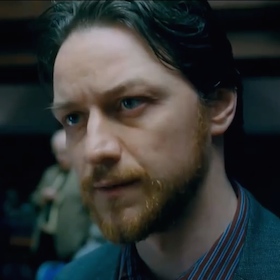'Filth' Blu-ray Review: A Deliciously Dark Comedy

4/5
Filth is, at its core, a combination of Abel Ferrara’s Bad Lieutenant (1992) and Trainspotting (1996). Considering Filth is based on the novel of the same name by Irvine Welsh, the author of Trainspotting, the trippy and hallucinogenic carryover isn’t surprising. Whereas Bad Lieutenant was a brutal unrelenting look at a lost soul in a lost world, Filth, directed by Jon S. Baird, cracks the window and allows a healthy dosage of humor. It’s the blackest of black humor, of course, but it makes the journey a little easier to go through.
The Blu-ray comes with a load of special features. There are deleted scenes, alternate scenes, extended scenes, outtakes, three featurettes and a full commentary track with both Baird and Welsh.
James McAvoy plays against type as Bruce Robertson, a corrupt, vicious and vulgar Detective Sergeant who enjoys drinking, drugs (a bad combination for the bi-polar detective), vendettas and “games.” McAvoy usually plays amiable characters, pleasant and clean, but he revels in the mire here. Actors often attest they have the most fun when playing villains, and McAvoy clearly enjoyed playing Robertson, and does everything possible to make him the worst fictional police officer of all time. You may not want to get a drink with Robertson, but McAvoy makes sure you can’t help but wonder about it.
Robertson believes he deserves a promotion and believes he’ll get this promotion if he solves the case of a murdered Japanese student. Along the way, Robertson starts hallucinating with growing frequency. Even when not hallucinating, writer-director Baird brightens his world sometimes to the point of neon pastels, saturated and oversaturated, reminiscent of A Clockwork Orange (1971). The result adds to the elevated reality of the proceedings while also detailing the escalating insanity of Robertson, which we’re meant to feel as proxies; going insane from grief and drug abuse probably isn’t fun.
As the film carries on with Robertson’s hallucinatory psychiatric sessions with Dr. Rossi (Jim Broadbent), we’re given some insight into his tragic backstory, only for the next scene to immediately reestablish what a lousy human being he is. It’s as if Baird wants to catch us in the act of empathy, winking at us for that one second where we found the Devil endearing. It’s a non-judgmental catch, and one you can’t help but smirk at.
Robertson isn’t a good person. He finds an almost supervillainous glee in dispatching those around him through various humiliations or pranks. He’ll blame his fart on someone else, he’ll sleep with his co-worker’s wife — just to give you an idea of the spectrum. Robertson, yet, is still somehow likeable, if only slightly. There is an undeniable desperation to him seen early in the film, when he is trying to save a dying father and failing miserably. He continually ruins the life and marriage of Blades (Eddie Marsan, who plays the loser role with squirming zeal), yet ends up, in one of his only positive acts, saving Blades’ relationship with his wife Bunty (Shirley Henderson). His video message to Blades is particularly well acted by McAvoy, and is one of the biggest catches Baird gets us with.
The flaw with the film is its conceit — it is gluttonous and excessive — in a way similar to The Wolf of Wall Street (2013), but with a substantial difference. Martin Scorsese’s Wolf was a portrait of excess, a blueprint that comments on the act while also indicting the audience for enjoying it, whereas Filth is simply meant to be filthy. It’s an ugly experience shining a light on the ugliness and has fun with it. Despite the fun of that, the movie can be a slog to get through, though trimming the film would likely rob it of some of its punch.
The climax of the film, however, is violent and hysterical, and its final denouement is a bleak yet oddly charming ending to the strange world that Baird and Welsh created. Purposely or not, Filth is a commentary on the society we live in now, just not in the way you’d expect. It’s not the themes of hatred or the complexities of sex, but of the censored world we suddenly live in. They say you can’t make films like Blazing Saddles (1974) or shows like All in the Family (1971) anymore because of this new politically correct day and age. Filth embraces all the things that are terrible in society — racism, homophobia, violence and misogyny to name a few — and plays it all for laughs. It doesn’t later chide us for it, it doesn’t wag a morally righteous finger, but reminds us of what comedy is meant to do in the first place: take something ugly and find what makes it funny. Even in its final little tragedy, Robertson can’t help but turn to the audience and laugh with us — same rules apply.
RELATED ARTICLES
Get the most-revealing celebrity conversations with the uInterview podcast!







Leave a comment